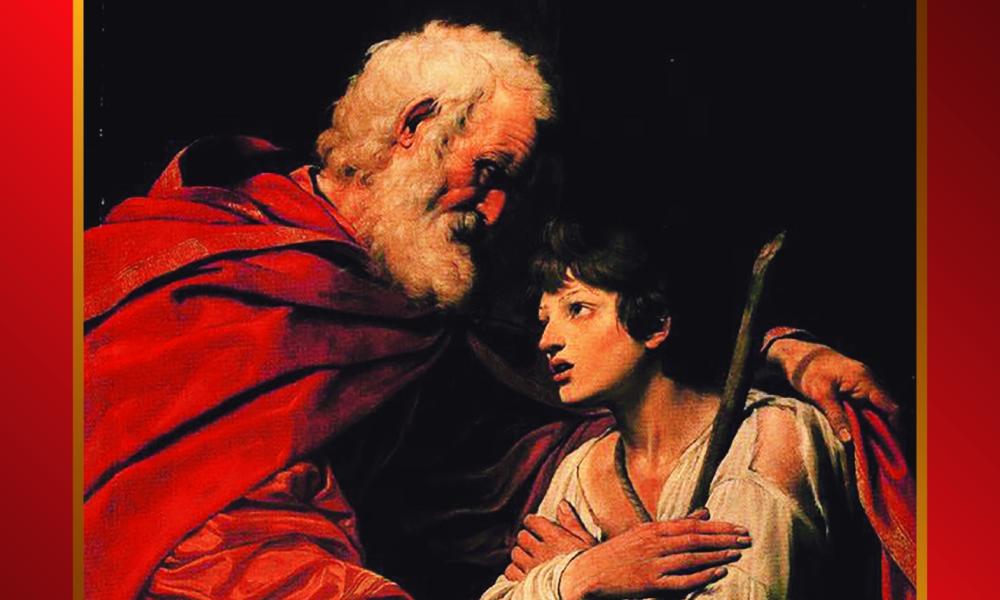
Jubilee Year of Mercy
On March 13, 2015, Pope Francis was presiding over a penance service in St. Peter’s Basilica when he announced an extraordinary Jubilee dedicated to Divine Mercy. During his homily for the service, the pontiff drew a clear connection between the sacrament of reconciliation and our heavenly Father, who is “rich in mercy” and who “extends his mercy with abundance over those who turn to him with a sincere heart.”
The pope indicated that his decision to call an extraordinary Jubilee arose from his reflection about how the “Church might make clear its mission of being a witness to mercy. It is a journey that begins with a spiritual conversion.” For this reason, Pope Francis put the mercy of God at the center of this Jubilee year and urged all the faithful “to live this year in the light of the Lord’s words: ‘Be merciful, just as your Father is merciful.’” (cf. Lk 6:36)
The basics
The Year of Mercy will begin on the Solemnity of the Immaculate Conception (December 8, 2015) and will end on the Sunday dedicated to Our Lord Jesus Christ, King of the Universe, or the Feast of Christ the King, on November 20, 2016. The pope declared the organization of the Jubilee was to be given over to the Pontifical Council for the promotion of the New Evangelization in the hope that it “might animate it as a new stage in the journey of the Church on its mission to bring to every person the Gospel of mercy.”
According to Archbishop Rino Fisichella, president of the Pontifical Council for the promotion of the New Evangelization, on the official website for the Year of Mercy (www.im.va), this year will be an opportunity to encourage Christians to meet the “real needs” of people with concrete assistance, to experience a “true pilgrimage” on foot, and to send “missionaries of mercy” throughout the world to forgive even the most serious of sins. In addition, several Jubilee days throughout the year will be devoted to specific groups, such as the Roman Curia, catechists, teenagers and prisoners. A complete calendar of events can be found on the Year of Mercy website.
In addition, the Sunday readings for Ordinary Time will be taken from the Gospel of Luke during the Jubilee. Luke is often referred to as “the evangelist of mercy” in part because it is in the Gospel of Luke that we find the famous parables of the lost sheep, the lost coin and the merciful father.
The background
According to Father Thomas Rosica, CSB, the CEO of the Salt and Light Catholic Television Network of Toronto, Canada, and assistant to Father Federico Lombardi, SJ, the Vatican’s official press spokesman, in ancient Hebrew tradition, the Jubilee Year was celebrated every 50 years. The purpose of the Jubilee Year was to “restore equality among all of the children of Israel, offering new possibilities to families which had lost their property and even their personal freedom.”
The Catholic practice of the Holy Year began with Pope Boniface VIII in 1300 and has been given a more spiritual significance. “It consists in a general pardon, an indulgence open to all, and the possibility to renew one’s relationship with God and neighbor.” In short, it is an opportunity to deepen our faith and to renew our commitment to live a life of Christian witness.
Why mercy matters: A brief reflection
In his 1980 encyclical, Dives in Misericordia, Pope Saint John Paul II describes how the yearning for justice can go awry when it is removed from its tension with love and mercy. He first affirms the Church’s support of the ardent desire to correct unjust relationships – whether among individuals, social groups and classes, individuals and states, or even entire political systems.
For Pope Saint John Paull II, love is greater than justice in that it is primary and fundamental. Justice “consists in the constant and firm will to give their due to God and neighbor” – which is to keep the commandments to love God and neighbor. Consequently, love conditions and orders justice, which, in turn, serves love. Put another way, without love, justice is rendered ultimately incapable of establishing or restoring right relationships between God and humanity or between neighbors. In fact, without love, justice can actually destroy the possibility of right relationships.
This brings us to mercy. The question of power lies at the core of the concept of mercy. Mercy is only conceivable when a relationship exists in which one party has power over another. In order to be merciful, one must have power over the one to whom mercy is shown.
Now, throughout our tradition, one of the attributes that has been assigned to God is that of omnipotence – all-powerful. This means we are ultimately at the mercy of God, for God has all the power. So how God exercises this power will be the key to teaching the proper spirit and use of power for Christians.
Jesus Christ teaches us that the humility of love constitutes the proper exercise of power. Simultaneously the incarnation of God’s love for humanity and his power – Jesus Christ, the Word of God, the Logos, the second person of the Trinity – emptied himself to take the form of a human being and accepted death on a cross (cf. Phil 2:7-8) so that we might be brought to life with Christ (cf. Eph 2:5) and share in the divine life of the Triune God. Christ chose to exercise his power by emptying himself and submitting to death so that we might have life more fully with him. (cf. John 4:9)
The mercy of Christ then reveals that the love of the Father is more primary and fundamental than the Father’s justice. Mercy, in the words of Dives in Misercordia, “signifies a special power of love, which prevails over the sin and infidelity” of the world. In fact, “love is transformed into mercy when it is necessary to go beyond the precise norm of justice – precise and often too narrow.”
However, this does not mean that justice is forgotten. On the contrary, in overcoming sin, love transformed into mercy restores right relationships, or justice, by restoring the dignity and value of the offending party. Furthermore, mercy actually calls the sinner to conversion, the most concrete expression of the presence of mercy.
Our Catholic faith demands that we live in the tension of love, mercy and justice. As Pope Saint John Paul II so eloquently put it, “Believing in the crucified Son means ‘seeing the Father,’ means believing that love is present in the world and that this love is more powerful than any kind of evil in which individuals, humanity, or the world are involved. Believing in this love means believing in mercy.” And true mercy is the most profound source of justice.
Did you know...
- The Year of Mercy will open on the 50th anniversary of the closing of the Second Vatican Council in 1965.
- Generally, Jubilees are celebrated every 25 years, but there have been several extraordinary Jubilees called (the Year of Mercy falls into this category). The last major Jubilee was called by Pope Saint John Paul II for the year 2000.
- There have been 26 ordinary Holy Year celebrations.
The Corporal and Spiritual Works of Mercy
The corporal works of mercy are:
- To feed the hungry
- To give drink to the thirsty
- To clothe the naked
- To harbor the harbor-less
- To visit the sick
- To ransom the captive
- To bury the dead
The spiritual works of mercy are:
- To instruct the ignorant
- To counsel the doubtful
- To admonish sinners
- To bear wrongs patiently
- To forgive offences willingly
- To comfort the afflicted
- To pray for the living and the dead
A sample "To-Do" List...
Here are just a few ways you can mark the Year of Mercy:
- Make sandwiches and pass them out to the homeless.
- Prepare and take a meal to someone in your community who is seriously ill or welcoming home a newborn.
- Pass out water bottles to the homeless.
- Donate baby formula to a local pregnancy help center.
- Go through your closet and give away what you don’t need.
- Host a clothing drive and donate the items.
- Volunteer to do manual labor to help in the upkeep of a homeless shelter.
- Become a mentor to a foster child.
- Volunteer at a hospital.
- Take the Eucharist to the homebound in your community.
- Lead a Bible study at a local prison.
- Mentor a teen at a juvenile correction center.
- Visit the cemetery and pray for the dead.
- Donate to ministries that offer free Catholic burials to those who are unable to afford one.
The Logo and Motto
The motto Merciful Like the Father (taken from the Gospel of Luke, 6:36) serves as an invitation to follow the merciful example of the Father who asks us not to judge or condemn but to forgive and to give love and forgiveness without measure. (cf. Lk 6:37-38)
The logo – the work of Jesuit priest Marko I. Rupnik – presents a small summa theologiae of the theme of mercy. In fact, it represents an image quite important to the early Church: that of the Son having taken upon his shoulders the lost soul demonstrating that it is the love of Christ that brings to completion the mystery of his incarnation culminating in redemption.
The Prayer
Pope Francis has composed a special prayer for the Jubilee Year of Mercy:
Lord Jesus Christ,
you have taught us to be merciful like the heavenly Father,
and have told us that whoever sees you sees Him.
Show us your face and we will be saved.
Your loving gaze freed Zacchaeus and Matthew from being enslaved by money;
the adulteress and Magdalene from seeking happiness only in created things;
made Peter weep after his betrayal,
and assured Paradise to the repentant thief.
Let us hear, as if addressed to each one of us, the words that you spoke to the Samaritan woman:
“If you knew the gift of God!”
You are the visible face of the invisible Father,
of the God who manifests his power above all by forgiveness and mercy:
let the Church be your visible face in the world, its Lord risen and glorified.
You willed that your ministers would also be clothed in weakness
in order that they may feel compassion for those in ignorance and error:
let everyone who approaches them feel sought after, loved, and forgiven by God.
Send your Spirit and consecrate every one of us with its anointing,
so that the Jubilee of Mercy may be a year of grace from the Lord,
and your Church, with renewed enthusiasm, may bring good news to the poor,
proclaim liberty to captives and the oppressed,
and restore sight to the blind.
We ask this of you, Lord Jesus, through the intercession of Mary, Mother of
Mercy; you who live and reign with the Father and the Holy Spirit for ever and ever.
Amen.



